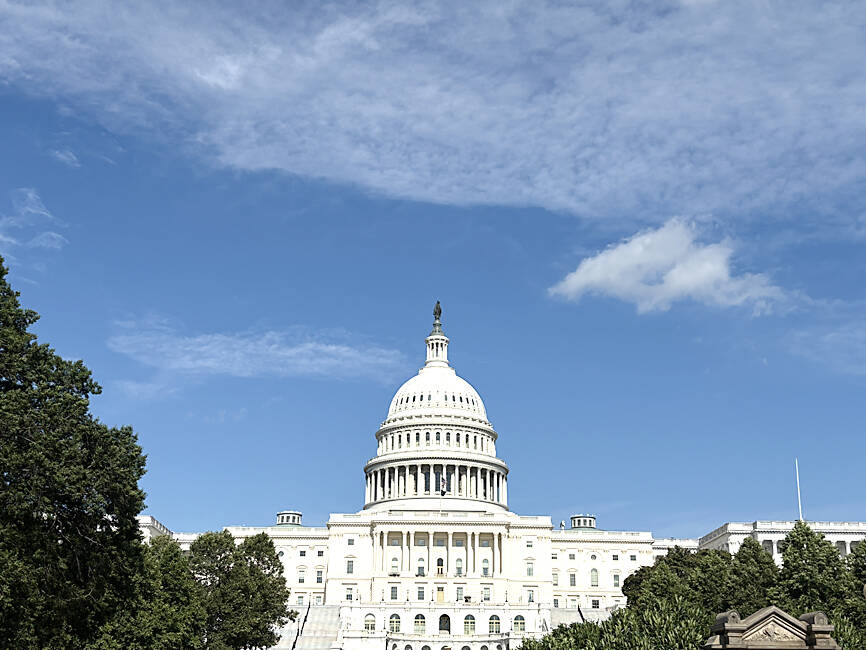The US House of Representatives on Monday passed a bill that seeks to deter Chinese military action against Taiwan by exposing the corruption of Chinese Communist Party (CCP) officials.
The bipartisan Taiwan Conflict Deterrence Act was introduced in early February by Republican Representative Lisa McClain and Democrat Representative Brad Sherman, targeting members of the CCP’s Politburo Standing Committee and other senior officials whose duties involve matters related to Taiwan.
The bill requires that “the Secretary of the Treasury publish a report on financial institutions and accounts connected to senior officials of the People’s Republic of China, to restrict financial services for certain immediate family of such officials, and for other purposes.”

Photo: CNA
The bill authorizes the US treasury secretary to prohibit CCP officials from accessing funds in US financial institutions and requires that an unclassified summary or portions of the report be made public on the US Department of the Treasury Web site, and social media accounts in Chinese and English.
The bill also requires the treasury secretary to prohibit financial institutions from conducting significant transactions with the immediate family members of the aforementioned officials.
“The United States cannot afford to be complacent in the face of growing Chinese aggression,” McClain said.
“As a proud representative from the state of Michigan, a state that knows the value of manufacturing, trade and international stability, I know firsthand how vital peace in the Indo-Pacific to American jobs and our economy is,” she said.
The Republican lawmaker later described Taiwan as a democratic partner and a key player in the global supply chain, in particular semiconductors.
“This bill sends a clear and bipartisan message: If the CCP rages war against Taiwan, there will be consequences,” McClain said. “We’re talking real, targeted consequences for corrupt CCP elites. Their financial dealings and offshore accounts will be exposed and published for the Chinese people to see.”
The bill needs to be passed by the US Senate before it can be signed into law by the US president.
The Taiwan Conflict Deterrence Act was unanimously passed by the House in the previous session, but it did not make it on to the US Senate’s agenda.
Meanwhile, Ministry of Foreign Affairs North American Affairs Department Director-General Wang Liang-yu (王良玉) yesterday told a news conference at the ministry that Taiwan continues to see bipartisan support from US lawmakers, including the Taiwan Conflict Deterrence Act and the Department of Defense Appropriations Act for Fiscal 2026, which was passed on Friday last week.
The US Congress has proposed more than 20 bipartisan bills or resolutions that directly support Taiwan, and more than 20 other bills or resolutions that involve supporting Taiwan, including strengthening Taiwan-US relations, supporting Taiwan’s international participation, and enhancing bilateral cooperation in tourism, trade and economics, and other aspects, she said.

PREPAREDNESS: Given the difficulty of importing ammunition during wartime, the Ministry of National Defense said it would prioritize ‘coproduction’ partnerships A newly formed unit of the Marine Corps tasked with land-based security operations has recently replaced its aging, domestically produced rifles with more advanced, US-made M4A1 rifles, a source said yesterday. The unnamed source familiar with the matter said the First Security Battalion of the Marine Corps’ Air Defense and Base Guard Group has replaced its older T65K2 rifles, which have been in service since the late 1980s, with the newly received M4A1s. The source did not say exactly when the upgrade took place or how many M4A1s were issued to the battalion. The confirmation came after Chinese-language media reported

The Taiwanese passport ranked 33rd in a global listing of passports by convenience this month, rising three places from last month’s ranking, but matching its position in January last year. The Henley Passport Index, an international ranking of passports by the number of designations its holder can travel to without a visa, showed that the Taiwan passport enables holders to travel to 139 countries and territories without a visa. Singapore’s passport was ranked the most powerful with visa-free access to 192 destinations out of 227, according to the index published on Tuesday by UK-based migration investment consultancy firm Henley and Partners. Japan’s and

A Ministry of Foreign Affairs official yesterday said that a delegation that visited China for an APEC meeting did not receive any kind of treatment that downgraded Taiwan’s sovereignty. Department of International Organizations Director-General Jonathan Sun (孫儉元) said that he and a group of ministry officials visited Shenzhen, China, to attend the APEC Informal Senior Officials’ Meeting last month. The trip went “smoothly and safely” for all Taiwanese delegates, as the Chinese side arranged the trip in accordance with long-standing practices, Sun said at the ministry’s weekly briefing. The Taiwanese group did not encounter any political suppression, he said. Sun made the remarks when

BROAD AGREEMENT: The two are nearing a trade deal to reduce Taiwan’s tariff to 15% and a commitment for TSMC to build five more fabs, a ‘New York Times’ report said Taiwan and the US have reached a broad consensus on a trade deal, the Executive Yuan’s Office of Trade Negotiations said yesterday, after a report said that Washington is set to reduce Taiwan’s tariff rate to 15 percent. The New York Times on Monday reported that the two nations are nearing a trade deal to reduce Taiwan’s tariff rate to 15 percent and commit Taiwan Semiconductor Manufacturing Co (TSMC, 台積電) to building at least five more facilities in the US. “The agreement, which has been under negotiation for months, is being legally scrubbed and could be announced this month,” the paper said,